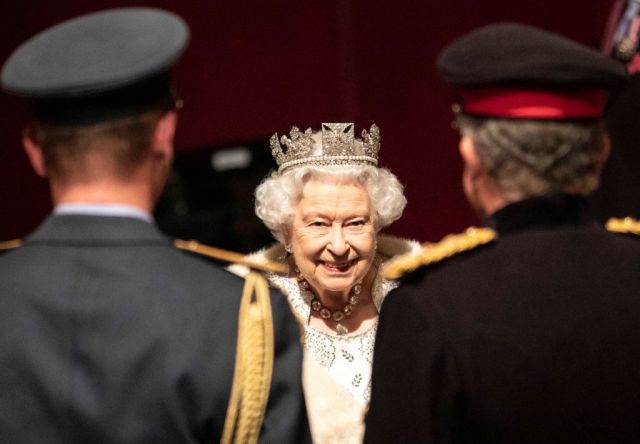Queen Elizabeth II at the State Opening of Parliament, 2019. Credit: Richard Pohle – WPA Pool/Getty

Monarchy’s justification in a democracy is that it lasts through the tribulations time brings. It does not always enjoy good health. It is more than capable of excess and foolishness that threaten its continuity. The margins are often fine.
Whether it does survive, or whether it plunges into crisis, can turn on the unexpected — where what is supposed to be is overturned by death or marital disaster. There is no way of human-proofing it. Monarchy must contend generation to generation, with the vulnerabilities inherent to human life.
It absorbs life’s seasons from birth to death. Each reign begins after a death and ends in one. It is an ongoing journey through mortality, resting on an idea that something given to each monarch at a reign’s beginning can at its end be passed on to the future. As Hilary Mantel has Thomas Cromwell meditate about kings in The Mirror & the Light: “that burst of light” bestowed in the coronation “has to last him. That instant’s transformation of grace must sustain him for thirty years, forty years, for the rest of his mortal life.” At times such as the crisis through which we are living — when, hour by hour, we know that in the midst of life we are in death and when we don’t know what’s coming for us — monarchy seasoned by death and rebirth has to be present. If it is not, it is pointless.
Last Sunday, in her four-minute broadcast from Windsor Castle, our 93-year-old Queen was unequivocally present. That is why her words and demeanour unleashed such deep emotion, even in life-long republicans like Alastair Campbell. In an unprecedented collective moment of worldwide fear and grief Queen Elizabeth II was present for the country and the Commonwealth, and present without performance or any overt display of emotion.
She made the past present too. Her life journey as monarch reaches deep into what Britain has chosen to remember about its past. When she invokes herself and her sister, Princess Margaret, broadcasting in October 1940 from Windsor on BBC’s Children’s Hour, and when she tells us “we will meet again”, she is summoning a story about the country’s endurance through a terrifying past trial.

Much could be remembered more accurately about all who fought for Britain during the Second World War, all who sacrificed, and at what human cost. Much has changed. The British empire is gone. The Union has seen rather better days. She has known much disappointment and sorrow, even in the last few months. But in reaching back to the past, she touched an ideal of collective purpose and individual stoicism that at times, it is too easy to suppose, is lost in its recesses. We would like to be who she remembers us to be, who she takes us to be, and perhaps because we listened to her, who we might find more compassion and inner strength to be.
Obviously the ‘we’ here is far from everybody. There are millions who did not watch on Sunday evening and who see no reason at all to care about what the Queen says. There are those who see the Queen not as a remarkable individual or a portal into a country’s collective memory. For them, she is a personification of unearned wealth and hierarchy, or an erroneous claim to British exceptionalism. There are those who do not see her at all. Some have scarcely ever been given a reason to feel or think that they belong to a collective realm she could symbolise.
Nonetheless, the ‘we’ of this monarchical moment is rather larger than those who voluntarily, knowingly, and happily would have signed up to any proposition about the monarchy’s usefulness a week ago. Under heightened conditions of life and death, there are bonds and attachments we discover we have to each other, to those who came before us, and to those who will come after us. Liberal ideas of the autonomous self and the conscious pursuit of self-realisation have always struggled with these wells of hidden, temporal emotion, sometimes with good reasons. But democratic politics need them and constitutional, powerless monarchy is as safe a vessel as there can be for them.
Monarchy, and this Queen in particular, are potent checks on a cavalier assumption that our lives are primarily made by our own choices. As she said in the year that marked the 40th anniversary of her accession, “it’s a question of maturing into something that one’s got used to doing, and accepting the fact that here you are, and it’s your fate”. But her capacity to move us also goes beyond her character. Her longevity could not be willed. Listening to her also comes with the knowledge that the time is not so far away when the country will have to go on without her.
Her reign has never escaped the travails thrown up by contingency. The rules of monarchy did not render her father King and she his heir. The Crown was not supposed to be the Queen’s fate. The heredity principle should have made her Nazi-sympathising uncle the country’s wartime King. If Edward VIII had stuck to the script and fathered a legitimate child, she would not have been more than the supporting cast.
George V died in the winter of 1936 fearing the worse for the monarchy, knowing responsibility for it would fall on his oldest son and that he was powerless to change anything about what happened next . “After I am dead,” he told the Prime Minster, Stanley Baldwin, “the boy will ruin himself in twelve months.” But the King held out hope that the monarchy would, nonetheless, survive.
During the last weeks of his life, he reportedly said: “I pray to God that my eldest won will never marry and that nothing will come between Bertie [George VI] and Lilibet (Queen Elizabeth) and the throne”. Of course, his eldest son did marry, but his chosen bride only precipitated the Queen’s future accession.
Her grandfather, whom she appears to have adored, lies in rest in Windsor chapel close to where she made her broadcast. It is hard to think he would have felt anything but entirely vindicated in his hope for the future, if, 84 years after his fearful death, he could have witnessed his granddaughter meet the gravity of the occasion this Palm Sunday.
Fortune has also given the Queen a long life. She is now the fourth longest reigning monarch in history. If she lives for a little more than four years more, no one will ever have reigned for longer. As it came to pass that Edward VIII abandoned the throne, so it also came to pass that the teenager who spent the Blitz with her sister in Windsor Castle still has time before a new King must, at a time he will not choose, begin again.
In this time of deep misfortune, the Queen spoke to us because in who she is, and who she became, she reminds us that arbitrary fortune works benevolently too — as it did for those who came before us and as it will for those who come after.










Join the discussion
Join like minded readers that support our journalism by becoming a paid subscriber
To join the discussion in the comments, become a paid subscriber.
Join like minded readers that support our journalism, read unlimited articles and enjoy other subscriber-only benefits.
Subscribe